
Applied Food Biotechnology
Scope & Guideline
Bridging disciplines to enhance food science and safety.
Introduction
Aims and Scopes
- Microbial Biotechnology in Food Production:
The journal emphasizes the role of various microorganisms, particularly lactic acid bacteria and probiotics, in the production and enhancement of food products, including fermented foods and beverages. - Food Safety and Preservation Techniques:
Research on novel preservation methods, such as biopreservation using natural antimicrobial agents, is a core area, focusing on enhancing food safety against pathogenic microorganisms. - Functional Foods and Nutraceuticals:
Studies that explore the health benefits of food components, including antioxidants, probiotics, and bioactive compounds, are prominently featured, highlighting the development of functional foods. - Innovative Processing Techniques:
The application of cutting-edge food processing technologies, including pulsed electric fields, ultrasound, and enzymatic methods, is a significant focus, aiming to improve food quality and shelf-life. - Sustainability and Waste Utilization:
Research on the utilization of food industry by-products and waste for the production of valuable compounds or as substrates for microbial fermentation is also a key area, promoting sustainability in food systems.
Trending and Emerging
- Nanotechnology in Food Systems:
The application of nanotechnology for food preservation, packaging, and delivery of bioactive compounds is gaining traction, indicating a trend towards more advanced and effective food technologies. - Plant-Based Probiotics and Prebiotics:
There is a significant increase in research exploring plant-based sources as probiotics and prebiotics, reflecting a growing interest in vegetarian and vegan dietary options. - Bioactive Compounds from Natural Sources:
Studies focusing on extracting and utilizing bioactive compounds from plants and algae for health benefits in food products are on the rise, highlighting a trend toward functional foods. - Sustainable Food Practices:
Research addressing sustainability in food production, including waste valorization and environmentally friendly processing techniques, is becoming increasingly prominent, aligning with global sustainability goals. - Molecular Techniques for Food Safety:
The use of advanced molecular techniques, such as qPCR for detecting food adulterants or pathogens, is trending, reflecting the need for rapid and accurate food safety assessments.
Declining or Waning
- Traditional Fermentation Techniques:
Research focusing exclusively on traditional fermentation processes has decreased, possibly due to a growing emphasis on innovative and industrial-scale applications of fermentation. - Animal-Based Probiotic Studies:
There has been a noticeable decline in studies centered on animal-derived probiotics, as the focus shifts towards plant-based and novel probiotic sources. - Basic Microbial Characterization:
Papers purely characterizing microbial strains without linking their applications or benefits in food biotechnology are less common, indicating a trend towards applied research. - Single-Molecule Antioxidant Studies:
Research centered on individual antioxidant compounds without exploring their synergistic effects or practical food applications has become less frequent, as the field moves towards more holistic approaches.
Similar Journals

Food Production Processing and Nutrition
Empowering scholars with breakthrough findings in food science.Food Production Processing and Nutrition, published by SpringerNature, stands at the forefront of advancing knowledge in the vibrant fields of food science, nutrition, and public health. This esteemed Open Access journal, operational since 2019, plays a pivotal role in disseminating breakthrough research that intersects food production processes with nutritional insights, making it an invaluable resource for researchers, professionals, and students alike. With a commendable 2023 impact factor reflecting its robust scholarly contributions — Q1 in Food Science and Q2 in both Nutrition and Dietetics and Public Health, Environmental and Occupational Health — the journal not only emphasizes the importance of innovative food processing methods but also addresses pressing nutritional challenges faced globally. Located in the United Kingdom, it claims an impressive Scopus ranking, with a notable percentile standing across various categorical metrics. As such, Food Production Processing and Nutrition is essential for anyone aiming to deepen their understanding of how food systems impact public health through effective processing and nutritional strategies.
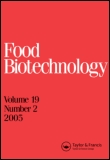
FOOD BIOTECHNOLOGY
Exploring the Intersection of Food and MicrobiologyFOOD BIOTECHNOLOGY is an essential journal for those engaged in the rapidly evolving fields of food science, biotechnology, and applied microbiology. Published by Taylor & Francis Inc., this journal has been a prominent platform since its inception in 1987, with a convergence of insights expected to continue until 2024. With an ISSN of 0890-5436 and an E-ISSN of 1532-4249, it holds significant academic weight, reflected in its 2023 rankings which place it in the Q3 category for both Applied Microbiology and Biotechnology and Biotechnology, alongside a stronger Q2 classification in Food Science. Although it currently does not operate as an open-access journal, its contributions to food biotechnology are invaluable for researchers, professionals, and students alike, providing a rigorous peer-reviewed outlet for innovative studies that advance the understanding of food processing, safety, and biotechnological applications. The journal’s relevance is further underscored by its Scopus rankings, which position it within the top tiers of its respective categories, making it a critical resource for the scientific community aiming to pioneer advancements in food biotechnology.

Acta Scientiarum Polonorum-Technologia Alimentaria
Bridging Research and Practice in Food SafetyActa Scientiarum Polonorum-Technologia Alimentaria, published by Poznan University of Life Sciences, is a revered journal in the field of food science, showcasing cutting-edge research and innovations in food technology. Established as a leading platform within its domain, this journal is indexed under Scopus and ranks in the 2023 Q3 quartile for Food Science, demonstrating its commitment to high-quality scholarship. With an ISSN of 1644-0730 and E-ISSN 1898-9594, it serves as a critical resource for researchers, professionals, and students seeking to stay at the forefront of advancements in food safety, quality control, and sustainable practices. The journal has also been recognized for its contributions to the agricultural and biological sciences, positioning itself at rank #205 out of 389 in this competitive field. While currently not offering open access, the journal's valuable insights and findings, especially as it publishes through 2024, play a crucial role in advancing knowledge and fostering collaboration among experts in the food science sector.

INDIAN JOURNAL OF MICROBIOLOGY
Shaping the Future of Microbiology ResearchINDIAN JOURNAL OF MICROBIOLOGY, published by Springer, serves as a vital platform for the dissemination of cutting-edge research in the field of microbiology. With an ISSN of 0046-8991 and an E-ISSN of 0973-7715, this esteemed journal invites contributions that span various disciplines within microbiology, encompassing both fundamental studies and applied research that can impact health, environment, and industry. Recognized in the Q3 category in Microbiology for 2023, and ranking #80 out of 182 in Scopus’ Microbiology category, it reflects its commitment to quality and significance in the academic community. Authors and researchers benefit from the journal's comprehensive review process, which enhances the visibility and reach of their work. While no open access options are currently offered, the INDIAN JOURNAL OF MICROBIOLOGY remains a premier choice for those aiming to contribute to the ongoing dialogue in microbiological studies, ensuring that knowledge continues to evolve and thrive.
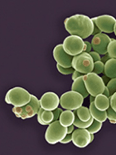
Annual Review of Food Science and Technology
Transforming Food Science Through Comprehensive ReviewsThe Annual Review of Food Science and Technology, published by ANNUAL REVIEWS, is an esteemed journal dedicated to advancing the knowledge within the field of food science. With an impressive Q1 ranking in the Food Science category, and ranking as #6 out of 389 in the Scopus Agricultural and Biological Sciences category, the journal serves as a vital resource for researchers, professionals, and students. This publication encapsulates comprehensive reviews and cutting-edge research, helping to bridge the gap between research and practical application. Though it does not offer Open Access, it provides valuable insights into various aspects of food science from 2010 to 2024, ensuring that its readership stays at the forefront of emerging trends and innovations. The journal's focus on high-quality, peer-reviewed articles makes it a critical platform for scholars looking to deepen their understanding and contribute to this rapidly evolving field.
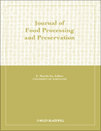
JOURNAL OF FOOD PROCESSING AND PRESERVATION
Advancing Food Science through Innovative ResearchJOURNAL OF FOOD PROCESSING AND PRESERVATION, published by Wiley-Hindawi, stands as a vital resource within the fields of Food Science, Chemical Engineering, and Chemistry. With an ISSN of 0145-8892 and an E-ISSN of 1745-4549, the journal has been a beacon of knowledge since its inception in 1977, continuing to provide valuable insights to the research community until 2024. Recognized for its quality, it holds a noteworthy Q2 ranking in 2023 across multiple categories, including Food Science and Chemical Engineering, indicating its influential contribution to the academic discourse. Although it offers no open access, the journal remains a crucial platform for disseminating groundbreaking research and innovative methodologies in food processing and preservation. Researchers, professionals, and students can significantly benefit from its comprehensive reviews, original research articles, and case studies, aimed at advancing knowledge and practices in food technology. By bridging the gap between theoretical advancements and practical applications, the JOURNAL OF FOOD PROCESSING AND PRESERVATION plays an essential role in addressing global food safety, sustainability, and quality challenges.
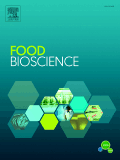
Food Bioscience
Pioneering Research at the Intersection of Food and BiologyFood Bioscience is a leading peer-reviewed journal published by Elsevier, dedicated to advancing the understanding of the complex interplay between food science and biosciences. With an impressive Impact Factor that places it in the Q1 and Q2 quartiles for Food Science and Biochemistry respectively, the journal consistently ranks among the top publications in its field, reflected in its Scopus rankings (Rank #83/389 in Food Science and Rank #175/438 in Biochemistry). Since its inception in 2013, Food Bioscience has fostered a multidisciplinary approach, bridging gaps between research in agricultural, biological, and food sciences, thus encouraging innovative solutions to the pressing challenges facing the global food supply chain. Although it currently operates under a subscription model, the journal is committed to disseminating high-quality research, making significant contributions to both academic scholarship and industry practices. Researchers, professionals, and students alike are invited to explore the wealth of knowledge contained within its pages as it plays a pivotal role in shaping the future of food bioscience.

Foods
Exploring the Science of Nutrition and Sustainability.Foods is a premier open access journal published by MDPI, based in Switzerland, that has been at the forefront of disseminating high-quality research in the fields of food science, health professions, and plant science since its establishment in 2012. With an impressive convergence of interdisciplinary studies spanning various aspects of food, nutrition, and microbiology, the journal aims to provide a comprehensive platform for researchers and professionals to share innovative ideas and findings. Maintained as a Q1 journal in multiple categories for 2023, including Food Science and Health Professions, Foods has garnered significant recognition within the academic community, reflected in its strong Scopus rankings and percentiles across various disciplines. The journal not only promotes open access to enhance the visibility and accessibility of research but also encourages the exploration of sustainable food systems and health-related issues, thus contributing to essential discussions in today's society. For those looking to advance their understanding and expertise in food-related sciences, Foods serves as an enduring resource for groundbreaking studies and critical insights.
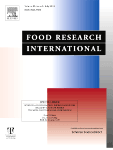
FOOD RESEARCH INTERNATIONAL
Connecting Experts in Food Science WorldwideFOOD RESEARCH INTERNATIONAL is a premier academic journal published by ELSEVIER, specializing in the field of Food Science. With an impressive impact factor and ranked Q1 in the 2023 category quartiles, it stands at the forefront of research, positioned 17th out of 389 in the Scopus ranking for Agricultural and Biological Sciences, attaining a commendable 95th percentile. The journal publishes high-quality, peer-reviewed articles that cover a broad spectrum of topics, including food safety, quality control, nutrition, and biotechnology, making it an invaluable resource for academics, industry professionals, and students alike. As FOOD RESEARCH INTERNATIONAL seeks to enhance understanding and advance technologies related to food, it encourages innovative perspectives and interdisciplinary research. The journal, active from 1992 and continuing through 2024, is an essential platform for disseminating vital findings and fostering collaboration within the global food science community.

Izvestiya Vuzov-Prikladnaya Khimiya i Biotekhnologiya
Exploring the Intersection of Theory and PracticeIzvestiya Vuzov-Prikladnaya Khimiya i Biotekhnologiya, published by Irkutsk National Research Technical University, is a prominent open-access journal dedicated to advancing the fields of applied chemistry and biotechnology. Since its inception in 2011, this journal has provided a platform for the dissemination of significant research findings, innovative techniques, and technological advancements that bridge the gap between theoretical frameworks and practical applications. The journal is indexed in various databases, ensuring that published works reach a global audience of researchers, professionals, and students eager to explore the latest developments in these critical disciplines. With its commitment to open-access publishing, Izvestiya Vuzov-Prikladnaya Khimiya i Biotekhnologiya plays a vital role in fostering collaboration and knowledge sharing within the scientific community, thus contributing to the advancement of both fields in a rapidly evolving technological landscape.